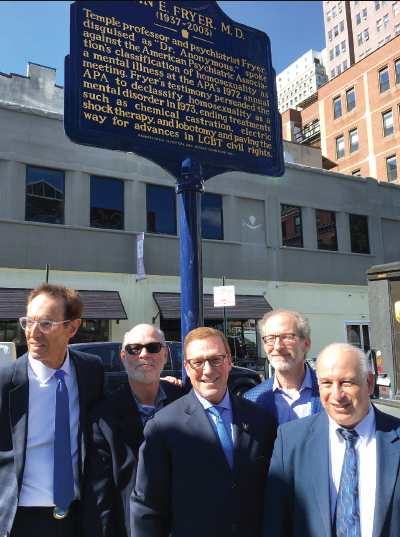Philadelphia Honors Pioneering Gay Psychiatrist John Fryer
Abstract
The City of Philadelphia last month unveiled a historic marker commemorating the late psychiatrist John Fryer, M.D., a pioneer for gay rights within APA as well as in the larger community.

Pictured beneath the historic marker about John Fryer, M.D., are (from left) Malcolm Lazin, executive director of Equality Forum; Roy Harker, M.D., executive director of the Association of Gay and Lesbian Psychiatrists; APA CEO and Medical Director Saul Levin, M.D., M.P.A.; Richard Summers, M.D., APA trustee-at-large and senior residency advisor in the Department of Psychiatry at the University of Pennsylvania Perelman School of Medicine; and Kenneth Certa, M.D., APA Assembly representative from Pennsylvania and director of the psychiatry residency training program at Thomas Jefferson University Hospital.
The marker honoring Fryer was unveiled in the heart of Philadelphia’s social hub for LGBTQ residents and across the street from the Historical Society of Pennsylvania, which houses Fryer’s archives. The marker is part of the Pennsylvania Historical Marker Program, administered by the Pennsylvania Historical and Museum Commission.
The marker is the result of advocacy by, among other groups, Equality Forum, a Philadelphia-based LGBT advocacy organization.
Fryer is credited with having ignited a movement within APA to destigmatize homosexuality, eventually leading to its removal from DSM. At APA’s 1972 Annual Meeting in Dallas, Fryer appeared in a mask as “Dr. Anonymous” and used a voice-distorting microphone to announce to members that he was gay.
“I am a homosexual. I am a psychiatrist,” he said. He told the group that he had suffered discrimination and had to remain anonymous because being gay would cost him his job. It was a year later that APA Trustees, after much debate and discussion, removed homosexuality from DSM.
Speaking at the unveiling, Levin said that Fryer was a trailblazer. “This dedication shows just how much progress has been made since Dr. Fryer staged his masked protest more than 40 years ago,” he said. “He was a hero to me and to countless others in the LGBT community.”
Levin said Fryer’s masked protest, and the removal of homosexuality from the DSM the next year, turned an important corner for psychiatry and for the rights of gay people. “One huge immediate benefit was that opponents of LGBTQ rights could no longer refer to homosexuality as a disease,” Levin said. “We know today, as many knew then, that there is simply no scientific evidence to support that claim. The definitive removal of homosexuality from the DSM remains a milestone for LGBTQ rights throughout the world.
“It was an act of tremendous courage by one man that got psychiatry on the right path regarding our treatment of the LGBTQ community. Though he wore a mask, Dr. Fryer’s protest was not without risk. In the early 1970s, the country was riding a wave of social change that began in the 1960s. Though great strides had been made for many minority groups on many fronts, the social climate for members of the LGBTQ community was still quite inhospitable.
“This was something Dr. Fryer knew firsthand. He had been forced to leave his residency at the University of Pennsylvania when it was learned that he was a homosexual. I believe that the injustice he suffered stayed with him for his entire life and played some role in his later decision to speak out on the injustices faced by LGBTQ people. I commend the University of Pennsylvania for acknowledging its past error and for its recognition of Dr. Fryer for the hero he is.” ■
The historic marker for Fryer sits at the corner of 13th and Locust streets in Philadelphia. More information can be accessed here.



